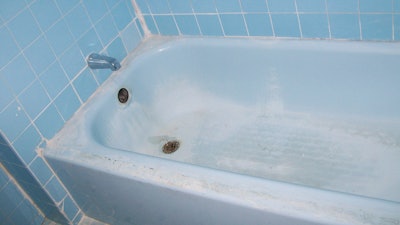
WASHINGTON (AP) — The Environmental Protection Agency on Friday banned consumer use of a popular but deadly paint stripper but stopped short of also banning commercial use of the product by tradespeople.
EPA Administrator Andrew Wheeler signed the rule, which will bar manufacture and import of the stripper methylene chloride for consumer use, in a private meeting Friday with relatives of a man who died while using the paint stripper.
The EPA cited "the acute fatalities that have resulted from exposure to the chemical" and an "unreasonable" risk to consumers. Retail stores have until later this year to remove the product from sale. Many big chains already stopped sale of products with methylene chloride in recent months, amid a campaign led by environmental groups and families of men overcome and killed by fumes from the paint stripper.
Goopy, strong-smelling products containing methylene chloride have been a go-to product for do-it-yourselfers for decades. But fumes from the product can affect the central nervous system, sometimes causing dizziness, disorientation and death. The state of California says it has tracked at least five U.S. deaths from methylene chloride since 2014.
The dead include a 21-year-old worker, Kevin Hartley, who had had training in use of the product, and Drew Wynne, a 31-year-old South Carolina man who was cleaning the floor of his start-up coffee company. Both died in 2017.
Hartley's and Wynne's families had been among those pressing for the ban, which had been initiated by the Obama administration but then stalled by the Trump administration.
Relatives of the dead men met last year with then-EPA chief Scott Pruitt and with lawmakers, pressing for prohibition of methylene chloride.
The EPA declined Friday to immediately extend the ban to commercial uses of the paint stripper. Instead, it said it would consider whether to mandate training in use of methylene chloride, or go on to ban commercial use of the solvent as well.
"I think that it's sad," said Yanira Merino, national president of the Labor Council for Latin American Advancement, which had pushed for the EPA to extend the ban to commercial use as well.
Latino and Hispanic workers in general are among those most vulnerable to the solvent, often lacking access to safety training and to safety directions in a language they can understand, Merino said.
"It's a sad time when you don't take into account the health of the people who work in a very important industry," Merino said.
Another of the men killed while using the solvent, also in 2017, was an El Salvador laborer who spoke only limited English, his family told California authorities.
The Trump administration "will be partly to blame when the next worker is injured or dies as a result of being exposed to this extremely dangerous chemical," attorney Melanie Benesh of the Environmental Working Group said.
The EPA was "catering to the wishes of the chemical industry," Benesh said.
The EPA under the Trump administration has been among the most active agencies in carrying out President Donald Trump's mission of rolling back regulations it sees as burdensome to business. The Trump administration especially targeted environmental protections associated with the Obama administration, repealing or weakening some Obama-era measures meant to slow climate change and lessen air and water pollution.
Before Friday, environmental groups could point to just one other significant instance of the Trump EPA tightening, rather than loosening, environmental or public health protections — a measure that could tighten nitrous oxide standards for heavy-duty truck engines, Anne Hawke of the Natural Resources Defense Council said.






















